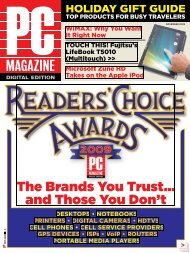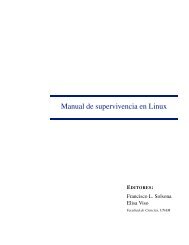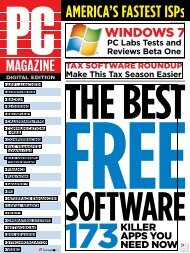PC Magazine - 2009 04.pdf - Libertad Zero - Blog
PC Magazine - 2009 04.pdf - Libertad Zero - Blog
PC Magazine - 2009 04.pdf - Libertad Zero - Blog
Create successful ePaper yourself
Turn your PDF publications into a flip-book with our unique Google optimized e-Paper software.
The biggest flaw in Apple’s near-perfect<br />
iPhone has always been the network it’s on.<br />
So as rumors have arisen once more (based<br />
on an old story from September) of Apple<br />
developing an iPhone for Verizon Wireless,<br />
the most reliable cell-phone network<br />
in the U.S., the Internet has been going<br />
absolutely nuts. Of course Apple wants<br />
to develop an iPhone for Verizon. At this<br />
point, Apple wants to develop an iPhone<br />
for everyone. There’s just one problem:<br />
the hideous, mysterious, Faustian contract<br />
Apple signed with AT&T. And that one is a<br />
showstopper.<br />
Apple’s exclusivity contract with<br />
AT&T was an attempt to rewrite the eco-<br />
nomics of the cell-phone business. This<br />
arrangement wasn’t about visual voice<br />
mail or even, really, about branding. It was<br />
about money and control. In exchange for<br />
a bond of blood, AT&T would kick some<br />
of its monthly subscription fees to Apple<br />
and let Apple control retail distribution.<br />
This was radical. This was unique. This<br />
was a failure.<br />
The iPhone sold well here, but the<br />
United States is a fraction of the global<br />
mobile market, and international carriers<br />
weren’t too comfortable with Apple<br />
cutting into their monthlies. It turned out<br />
that mobile-phone carriers around the<br />
world are much more comfortable kicking<br />
in one-time subsidies than kicking back<br />
monthly fees. So for the international market,<br />
Apple went to a much more normal<br />
system of accounting (normal for the cellphone<br />
industry, that is), and as a result, the<br />
iPhone has reached spectacular sales numbers<br />
around the world.<br />
28 <strong>PC</strong> MAGAZINE DIGITAL EDITION APRIL <strong>2009</strong><br />
SASCHA SEGAN<br />
iPhones for Everyone!<br />
Along the way, Apple has also learned<br />
that tying itself to one wireless carrier<br />
damages, rather than reinforces, its brand.<br />
This is because the quality of its product<br />
becomes too tightly coupled to the quality<br />
of that carrier. Notice that in many of<br />
Apple’s “later” countries, the iPhone is<br />
available on multiple carriers. Apple’s<br />
acting CEO Tim Cook has clearly stated<br />
that the company is not married to a one-<br />
carrier strategy.<br />
Apple has also gotten more flexible<br />
in regard to pricing and distribution, two<br />
major stumbling blocks when Apple first<br />
tried to get Verizon interested in the firstgeneration<br />
iPhone, at least if you believe<br />
Developing a new iPhone for Verizon will take<br />
a year or so. But Apple plans ahead: It’ll have that<br />
phone ready when its AT&T contract is up.<br />
USA Today. Heck, these days the iPhone<br />
is available even at Wal-Marts across the<br />
country. Apple of <strong>2009</strong>, as opposed to<br />
Apple of 2006, is much more willing to<br />
work and partner with mobile-phone carriers<br />
and third-party retailers.<br />
Mobile-phone carriers have learned a<br />
couple of things in the past few years as<br />
well. Everyone’s dabbled with visual voice<br />
mail. Phones like the T-Mobile G1 and the<br />
Palm Pre have made U.S. carriers more<br />
comfortable with phone manufacturers’<br />
taking a starring role in product rollouts<br />
and software updates, though Apple takes<br />
that kind of control to a new level. Two<br />
years have also proved that the iPhone is<br />
a unique phenomenon that everybody<br />
wants in on.<br />
So Apple will put iPhones on everyone’s<br />
network, but in the U.S. it will want<br />
to put them on Verizon’s first. Verizon is<br />
now the largest carrier in the country. Also,<br />
Sprint has what Apple would consider<br />
an unhealthy relationship with Palm, and<br />
T-Mobile has that Google Android thing<br />
going on.<br />
If the iPhone were to go to Verizon<br />
before 2010, Apple would have to build a<br />
version for Verizon’s CDMA network. That<br />
would have been a great chore back in 2007.<br />
Apple isn’t actually that big a company;<br />
developing two cell phones from scratch<br />
would have been a big deal for it. But Apple<br />
is going on its third phone by now, and it<br />
has a few years of experience. The company<br />
could pull it off at this point.<br />
Developing a new phone for Verizon<br />
will take a year or so (especially considering<br />
the tasks of getting it through the FCC<br />
and Verizon’s own hellish network-testing<br />
process). But Apple plans ahead: It’ll have<br />
that phone ready when its AT&T contract<br />
is up. Verizon will likely demand a threemonth<br />
CDMA exclusivity agreement,<br />
to which Apple will consent. Sprint and<br />
T-Mobile will follow after a few months.<br />
If the AT&T contract lasts past 2010,<br />
a Verizon launch gets even easier. The<br />
iPhone could be one of the first devices<br />
on Verizon’s new LTE network, which will<br />
use a fourth-generation technology that<br />
Verizon will share with AT&T, T-Mobile,<br />
and dozens of international carriers. An<br />
LTE iPhone would eventually be an almost<br />
universal device.<br />
Apple’s AT&T contract is still shrouded<br />
in mystery. All we know about the terms is<br />
that the contract is a “multiyear.” Under<br />
the most liberal interpretation, that means<br />
Apple could be out from under AT&T’s<br />
thumb by July. But USA Today reported<br />
in separate stories that the contract runs<br />
through the end of 2010 or even 2012,<br />
which puts the Verizon launch firmly in<br />
the LTE zone. I’m pretty sure that whenever<br />
that clock goes ding, a whole lot more<br />
people will be able to buy iPhones.<br />
STAY PHONE-SMART Keep up with the<br />
latest on smartphones by reading Sascha’s<br />
column at go.pcmag.com/segan.







